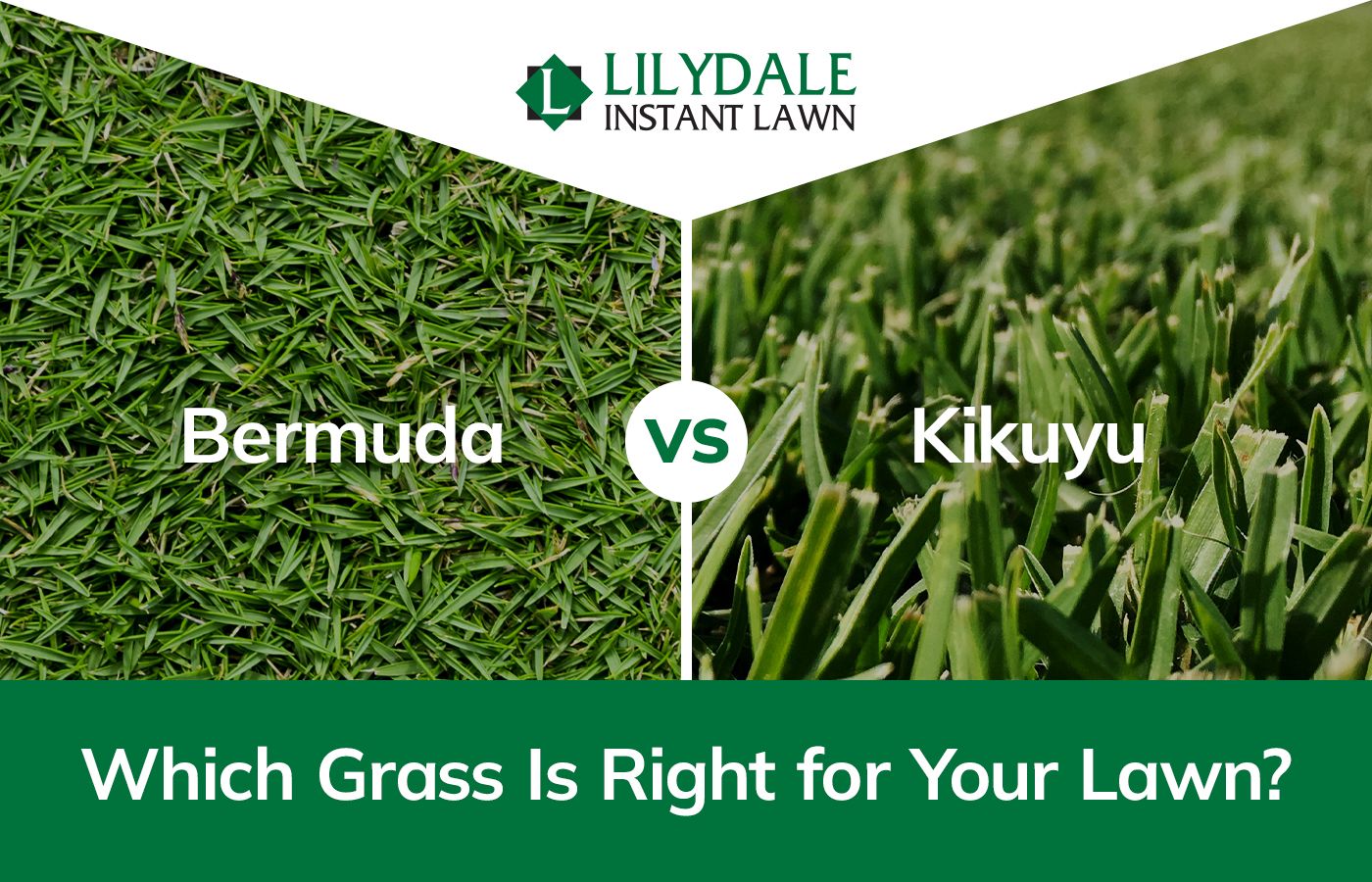7 λεπτά ανάγνωσης
Ποιο είναι το καλύτερο για το γκαζόν σας;
Το Bermuda (ή καναπές) και το Kikuyu είναι δύο από τους πιο συνηθισμένους τύπους χλοοτάπητα θερμής περιόδου που χρησιμοποιούνται σε όλη την Αυστραλία. Και τα δύο είναι ανθεκτικά, ανθεκτικά στην ξηρασία χόρτα που ευδοκιμούν σε ηλιόλουστες αυλές, αλλά διαφέρουν ως προς τις συνήθειες ανάπτυξης, τις ανάγκες συντήρησης και τη συνολική απόδοση.
Η κατανόηση αυτών των διαφορών είναι απαραίτητη για τους ιδιοκτήτες σπιτιών που επιλέγουν τη σωστή ποικιλία γκαζόν. Σε αυτόν τον οδηγό, θα συγκρίνουμε το γρασίδι Bermuda με το Kikuyu, θα επισημάνουμε τα πλεονεκτήματα και τα μειονεκτήματά τους και θα εξηγήσουμε ποιος τύπος χλοοτάπητα είναι ο πιο κατάλληλος για τις διαφορετικές συνθήκες της Αυστραλίας.
Κατανόηση του χόρτου Bermuda και Kikuyu
Το γρασίδι Bermuda, γνωστότερο στην Αυστραλία ως couch, είναι μια ποικιλία χλοοτάπητα με λεπτά φύλλα και χαμηλή ανάπτυξη, που εκτιμάται για την αντοχή του στην ξηρασία και τη διάρκεια του. Οι σύγχρονες ποικιλίες, όπωςτο TifTuf Bermuda,έχουνεκτραφεί για την εξαιρετική αντοχή τους στην ξηρασία, το βαθύ ριζικό τους σύστημα και την υψηλή αντοχή τους στη φθορά, γεγονός που τις καθιστά δημοφιλείς σε γήπεδα γκολφ, αθλητικούς χώρους και αυλές κατοικιών σε ζεστά και ξηρά κλίματα.
Το γρασίδι Kikuyu είναι μια εύρωστη ποικιλία με μεσαίου μεγέθους φύλλα, που αναπτύσσεται γρήγορα και εξαπλώνεται μέσω ταχέως αναπτυσσόμενων παραφυάδων. Αναπτύσσεται σε πλήρη ηλιοφάνεια και είναι ιδιαίτερα ανθεκτικό, γι' αυτό και χρησιμοποιείται ευρέως σε μεγάλους χλοοτάπητες, σχολεία και αθλητικούς χώρους. Ωστόσο, το Kikuyu απαιτεί συχνό κούρεμα και μπορεί να γίνει επιθετικό αν δεν συντηρείται σωστά, καθώς έχει την τάση να εξαπλώνεται στα γύρω παρτέρια.
Μαζί, το Bermuda και το Kikuyu είναι δύο από τα πιο διαδεδομένα είδη χλοοτάπητα θερμής περιόδου στην Αυστραλία, το καθένα από τα οποία προσφέρει μοναδικά πλεονεκτήματα για διαφορετικές συνθήκες γκαζόν.
Ποιο γρασίδι αντέχει καλύτερα στο κλίμα της Αυστραλίας: το Bermuda ή το Kikuyu;
Η βερμούδα (καναπές) γενικά αντέχει καλύτερα στις συνθήκες ξηρασίας της Αυστραλίας από το κικούγιου, χάρη στις βαθιές ρίζες της και την αποδοτική χρήση του νερού. Η TifTuf Bermuda έχειεκτραφεί για υψηλή αντοχή στην ξηρασίακαιαποδίδει αξιόπιστα σε ζεστές, ξηρές περιοχές. Το κικούγιου αντέχει καλά στη ζέστη, αλλά συνήθως χρειάζεται περισσότερο πότισμα για να διατηρήσει το χρώμα και την πυκνότητά του σε παρατεταμένες περιόδους ξηρασίας.
- Αντοχή στην ξηρασία και αποδοτικότητα νερού: Τα γκαζόνBermuda(ειδικά το TifTuf Bermuda) είναι ιδιαίτερα ανθεκτικά στην ξηρασία και καταναλώνουν λιγότερο νερό υπό περιορισμούς. Το Kikuyu είναι ανθεκτικό, αλλά μπορεί να αραιώσει ή να κιτρινίσει κατά τη διάρκεια παρατεταμένης ξηρασίας χωρίς άρδευση και λίπασμα.
- Αντοχή στη σκιά:Και τα δύοπροτιμούν τον ήλιο, αλλά το Bermuda αντέχει μέτρια τη σκιά. Το Kikuyu προτιμά τον πλήρη ήλιο και γίνεται ανομοιόμορφο στη σκιά.
- Κατάλληλη επιλογή:ΕπιλέξτεBermuda για γκαζόν με χαμηλή κατανάλωση νερού και ανθεκτικό στην ξηρασία σε ζεστές, ξηρές περιοχές. Επιλέξτε Kikuyu για ηλιόλουστες αυλές όπου προτεραιότητα έχει η γρήγορη κάλυψη και η αντοχή στη φθορά.
Συνήθειες ανάπτυξης και ανάγκες συντήρησης
Τα γκαζόν Bermuda και Kikuyu διαφέρουν ως προς τον τρόπο ανάπτυξης, εξάπλωσης και συντήρησης που απαιτούν. Ο παρακάτω πίνακας επισημαίνει τους βασικούς παράγοντες συντήρησης που πρέπει να λαμβάνουν υπόψη οι ιδιοκτήτες σπιτιών:
| Χαρακτηριστικό γνώρισμα | Γρασίδι των Βερμούδων | Χόρτο Κικούγιου |
|---|---|---|
| Συνήθεια ανάπτυξης | Λεπτόφυλλο, χαμηλής ανάπτυξης, πυκνό στρώμα. | Μεσαίου μεγέθους φύλλα, έντονη ανάπτυξη, γρήγορη εξάπλωση |
| Συχνότητα κούρεμα | Μέτρια; η βραδύτερη ανάπτυξη σημαίνει λιγότερο κούρεμα. | Υψηλό, χρειάζεται συχνό κούρεμα, ειδικά τους θερμότερους μήνες. |
| Εισβολικότητα | Λιγότερο επεμβατικό, εξαπλώνεται σταθερά αλλά είναι ελεγχόμενο. | Ιδιαίτερα εισβλητικό, συχνά εισχωρεί σε παρτέρια και μονοπάτια κήπων. |
| Συσσώρευση άχυρου | Ελάχιστη, αν συντηρείται σωστά. | Δημιουργεί γρήγορα στρώμα από ξερά χόρτα, απαιτεί πιο τακτικό ξεσκόνισμα. |
| Ανάγκες σε λιπάσματα | Οφέλη από ισορροπημένο λίπασμα, αλλά χαμηλή συνολική εισροή. | Απαιτεί περισσότερη λίπανση για να παραμείνει πλούσιο και πράσινο. |
| Επίπεδο συντήρησης | Χαμηλότερο κόστος συντήρησης, ιδανικό για ιδιοκτήτες σπιτιών που επιθυμούν έναν τακτοποιημένο, ανθεκτικό στην ξηρασία γκαζόν. | Υψηλότερο κόστος συντήρησης, καλύτερο για μεγάλους ηλιόλουστους χώρους όπου η συντήρηση είναι εφικτή. |
Ανθεκτικότητα και αντοχή στη φθορά

Όσον αφορά την έντονη χρήση, τόσο το Bermuda όσο και το Kikuyu είναι ανθεκτικά χόρτα θερμής περιόδου. Ακολουθούν τα βασικά σημεία που πρέπει να λάβετε υπόψη:
- Υψηλή αντοχή στη φθορά:Και τα δύο είδηχόρτου αντέχουν στην κυκλοφορία παιδιών, κατοικίδιων ζώων και στην τακτική χρήση στην αυλή.
- Απόδοση σε αθλητικούς χώρους:Το Bermuda(couch) χρησιμοποιείται ευρέως σε γήπεδα γκολφ και επαγγελματικούς αθλητικούς χώρους λόγω της λεπτής υφής και της ομοιόμορφης επιφάνειάς του. Το Kikuyu επιλέγεται συχνά για κοινοτικά γήπεδα και σχολικούς χώρους, καθώς ανακάμπτει γρήγορα μετά από φθορά.
- Ικανότητα αυτοεπιδιόρθωσης:Το Bermudaέχει εξαιρετικές ιδιότητες αυτοεπιδιόρθωσης χάρη στην πυκνή, λεπτή δομή των φύλλων του.Το Kikuyu επίσης αναγεννάται γρήγορα,αλλάβασίζεται σε επιθετικούς βλαστούς που μπορούν να εισβάλουν στα παρτέρια του κήπου.
- Εποχιακή ανθεκτικότητα: Τα γκαζόντων Βερμούδωνδιατηρούν την ανθεκτικότητά τους σε όλες τις εποχές με την κατάλληλη φροντίδα. Τα γκαζόν Kikuyu ανακάμπτουν γρήγορα το καλοκαίρι, αλλά μπορεί να αραιώσουν τους πιο δροσερούς μήνες.

Και τα δύο είδη χόρτου είναι εξαιρετικές επιλογές για περιοχές με υψηλή κυκλοφορία, αλλά η επιλογή εξαρτάται από το αν προτιμάτε το λεπτό, κατάλληλο για αθλητικές δραστηριότητες φινίρισμα του Bermuda ή την γρήγορη ανάκαμψη και ανθεκτικότητα του Kikuyu.
Αισθητική ελκυστικότητα: Χρώμα, υφή και αίσθηση
Η εμφάνιση και η αίσθηση του γκαζόν σας μπορεί να είναι εξίσου σημαντική με την ανθεκτικότητα ή την αντοχή του στην ξηρασία. Το γρασίδι Bermuda, επίσης γνωστό ως couch, έχει λεπτές λεπίδες φύλλων που δημιουργούν ένα ομαλό, μοκέτα-όμοιο φινίρισμα. Είναι απαλό στο πάτημα, καθιστώντας το άνετο για οικογένειες που περνούν πολύ χρόνο σε εξωτερικούς χώρους.
Με τη σωστή φροντίδα, τα γκαζόν των Βερμούδων διατηρούν το χρώμα τους και την περιποιημένη, καλαίσθητη εμφάνισή τους, που μοιάζει με την επιφάνεια των γηπέδων γκολφ.
Το γρασίδι Kikuyu, αντίθετα, έχει μεσαίου μεγέθους φύλλα που του προσδίδουν μια ελαφρώς πιο χονδροειδή υφή. Το έντονο πράσινο χρώμα του είναι ελκυστικό κατά τους θερμότερους μήνες, αλλά μπορεί να χάσει τη ζωντάνια του το χειμώνα, εκτός αν ενισχυθεί με λίπασμα. Η ταχεία ανάπτυξη του Kikuyu συχνά έχει ως αποτέλεσμα μια πιο πυκνή και ανθεκτική εμφάνιση, η οποία ταιριάζει σε μεγάλους ανοιχτούς χώρους, αλλά μπορεί να φαίνεται λιγότερο εκλεπτυσμένη σε σύγκριση με το πυκνό φινίρισμα του Bermuda.
Όταν επιλέγετε μεταξύ των δύο, σκεφτείτε αν προτιμάτε τα λεπτά φύλλα και την επαγγελματική αισθητική του Bermuda ή την πλούσια, ζωηρή εμφάνιση του Kikuyu που ευδοκιμεί σε ηλιόλουστες αυλές.
Πότε να επιλέξετε Bermuda έναντι Kikuyu
Αν δεν μπορείτε να αποφασίσετε μεταξύ Bermuda και Kikuyu, εδώ είναι οι περιπτώσεις όπου κάθε τύπος χόρτου ταιριάζει καλύτερα:
Επιλέξτε το γρασίδι Bermuda (couch) εάν:
- Ζείτε σε μια περιοχή που είναι επιρρεπής σε ξηρασία και θέλετε ένα γκαζόν ανθεκτικό στην ξηρασία που καταναλώνει λιγότερο νερό.
- Προτιμάτε ένα λεπτόφυλλο γρασίδι με περιποιημένη εμφάνιση, παρόμοιο με το χλοοτάπητα των γηπέδων γκολφ.
- Θέλετε λιγότερη συντήρηση με μέτριο κούρεμα και λιγότερη συσσώρευση χόρτου.
- Η αυλή σας έχει πλήρη ηλιοφάνεια ή ελαφριά σκιά.
Επιλέξτε το γρασίδι Kikuyu εάν:
- Χρειάζεστε γρήγορη κάλυψη για μεγάλους, ηλιόλουστους χλοοτάπητες ή ανοιχτούς χώρους.
- Ψάχνετε για μια οικονομική ποικιλία χλοοτάπητα που εγκαθίσταται γρήγορα.
- Ο χλοοτάπητάς σας δέχεται έντονη κυκλοφορία από παιδιά, κατοικίδια ζώα ή από την κοινότητα.
- Δεν σας πειράζει να κουρεύετε συχνά το γκαζόν και να διαχειρίζεστε τα εισβλητικά φυτά κοντά στα παρτέρια του κήπου.
Ζυγίζοντας αυτά τα σενάρια, μπορείτε να επιλέξετε την κατάλληλη ποικιλία χόρτου για τον τρόπο ζωής σας, τις συνθήκες του κήπου σας και τις προτιμήσεις σας όσον αφορά τη συντήρηση.
Συχνές ερωτήσεις
Είναι το γρασίδι Bermuda πιο ανθεκτικό στην ξηρασία από το Kikuyu;
Ναι, το γρασίδι Bermuda, ειδικά το TifTuf Bermuda, έχει μεγαλύτερη αντοχή στην ξηρασία από το Kikuyu. Το βαθύ ριζικό του σύστημα του επιτρέπει να επιβιώνει σε μεγάλες περιόδους ξηρασίας με λιγότερο νερό, ενώ το Kikuyu συνήθως χρειάζεται πιο συχνό πότισμα για να διατηρήσει την πυκνότητα και το χρώμα του σε συνθήκες ξηρασίας.
Ποιο γρασίδι μεγαλώνει πιο γρήγορα, το Bermuda ή το Kikuyu;
Το Kikuyu μεγαλώνει πιο γρήγορα από το γρασίδι Bermuda. Εγκαθίσταται γρήγορα, εξαπλώνεται δυναμικά με παραφυάδες και καλύπτει τα γυμνά σημεία σε χρόνο ρεκόρ. Το Bermuda έχει ελαφρώς πιο αργό ρυθμό ανάπτυξης, αλλά δημιουργεί ένα πυκνό, λεπτόφυλλο γκαζόν μόλις εγκατασταθεί.
Το Kikuyu καταλαμβάνει τους χλοοτάπητες των Βερμούδων;
Ναι, το Kikuyu μπορεί να καταλάβει τους χλοοτάπητες των Βερμούδων αν δεν ελέγχεται. Τα γρήγορα εξαπλωμένα στολόνια και ριζώματα του μπορούν να εισβάλουν στον περιβάλλοντα χλοοτάπητα, απαιτώντας τακτικό κούρεμα, κόψιμο των άκρων ή επιλεκτική εφαρμογή ζιζανιοκτόνων για τον έλεγχο του.
Ποιο γρασίδι είναι καλύτερο για γήπεδα και περιοχές με υψηλή κυκλοφορία;
Και τα δύο είναι ανθεκτικά, αλλάτο Bermuda προτιμάται συχνά για γήπεδα ελίτ αθλημάτων, ενώ το Kikuyu ταιριάζει σε γήπεδα κοινοτήτων. Το Bermuda παρέχει μια λεπτή, ομοιόμορφη επιφάνεια παιχνιδιού, ιδανική για γήπεδα γκολφ και στάδια, ενώ το Kikuyu ανακάμπτει γρήγορα από την έντονη φθορά, καθιστώντας το δημοφιλές για οβάλ γήπεδα, σχολεία και δημόσιους χώρους.
Βρείτε το κατάλληλο γρασίδι για τον κήπο σας
Τελικά, η επιλογή του κατάλληλου γκαζόν εξαρτάται από τον τρόπο ζωής σας και τις ανάγκες του κήπου σας. Μερικοί ιδιοκτήτες σπιτιών προτιμούν την τακτοποιημένη, περιποιημένη εμφάνιση ενός γκαζόν Bermuda, ενώ άλλοι προτιμούν την πλούσια, έντονη ανάπτυξη του Kikuyu.
Αν είστε έτοιμοι να δημιουργήσετε ένα γκαζόν που ταιριάζει στον τρόπο ζωής σας, η Lilydale Instant Lawn μπορεί να σας βοηθήσει να κάνετε την επιλογή και να την υλοποιήσετε. Από το TifTuf Bermuda για περιοχές επιρρεπείς σε ξηρασία έωςτο Eureka Premium VG Kikuyuγιαγρήγορη κάλυψη και ανθεκτικότητα, οι ποικιλίες χλοοτάπητα μας καλλιεργούνται για να ευδοκιμούν στις συνθήκες της Αυστραλίας.
Εξερευνήστε τη γκάμα μαςήμιλήστε με την ομάδα μας για να βρείτε το γρασίδι που σας ταιριάζει και απολαύστε ένα πιο πράσινο και υγιές γκαζόν όλο το χρόνο.

















